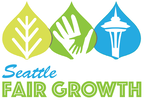|
by John Fox and Carolee Colter, Seattle Displacement Coalition reprinted from Pacific Publishing newspapers April 2016 The Seattle Displacement Coalition has deep roots in Seattle’s neighborhood movement. We’ve written this “Outside City Hall” column, featuring important neighborhood issues, for 13 years. We personally know most of the leaders of Seattle’s active community councils, and our views are nearly always in synch with theirs. For example, the Laurelhurst Community Council, representing one of Seattle’s toniest neighborhoods, was among the first to back a tough demolition-control law barring developers from tearing down our city’s affordable housing stock unless units were replaced one-for-one at comparable price. continued... We worked closely with the Othello Community Council and other resident groups to defeat state legislation that would have mandated mid- to high-rise densities around rail stops in Southeast Seattle. The law would have set off redevelopment in areas chocked full of what remains of Seattle’s low-income rental stock, particularly larger affordable rentals occupied by families of color.
It was a multi-racial mix of Southeast Seattle neighborhood advocates who blocked a move by city officials to trump up a definition of blight that would have allowed condemnation and redevelopment of large swaths of land filled with low-income minority families. It was not the nonprofit housing developers or the “new urbanists” now linking arms with for-profit developers and backing the mayor’s so-called affordable housing strategy, but resident activists — mostly homeowners from Capitol Hill, Ballard and West Seattle — who first called for developer-impact fees, inclusionary housing requirements and a “no-net-loss” affordable housing requirement. Without passage of such preservation strategies, homelessness will continue to rise in our city. Scapegoating? Which brings us to the activities of a recently established group calling itself the Neighborhood Safety Alliance. This collection of self-proclaimed neighborhood leaders from Ballard, Magnolia, North Seattle and Queen Anne formed for the single purpose of drawing more police to their communities for immediate help in removal of the homeless and criminals from their neighborhoods. The group has struck a chord with largely white homeowners frustrated by a spike in break-ins and burglaries and the visible rise in homelessness in their communities, especially the growing presence of car campers. The group shows no interest in drawing a distinction between the few who cause these crimes (data indicate they’re often teenagers from families with homes in these communities, not street inhabitants) and the vast majority simply in need. News reports and their own posted videos show hundreds of largely white, angry residents anxious to pin the blame on the homeless and on car campers and typecast these folks as dangerous, drug-addled outsiders. For them, the solution means getting rid of all car campers, homeless encampments and homeless in general from their neighborhoods. We see no interest from them in trying to understand or address the underlying needs of those on the streets or, of equal importance, in addressing the structural roots of poverty and homelessness in our city, or the lack of community-based alcohol, mental health and drug treatment needed by about 30 percent of the homeless. Ultimately, all the police in the world, all the sweeps, fines or jail time for camping, sleeping in our parks, panhandling, sitting on our sidewalks — none of that will make an ounce of difference if we continue to lose affordable housing at the current alarming rate in our city. We’re not knocking the need for adequate police response to real crime. We support public meetings to discuss public safety. But if there’s no effort to understand and address the disparate impacts of increased police enforcement on people of color, low-income people and the homeless themselves, and if there’s no attempt to respond to actions by local government that cause the loss of low-income housing, then it’s just a bunch of frenzied reactionaries practicing the age-old art of victimage and scapegoating. Not a neighborhood movement From what we’ve seen so far of the Neighborhood Safety Alliance — its presentations, comments to press and website — these folks are not the folks we work with. They don’t come from Seattle’s community council movement. And it would be 100-percent wrong to link the comments, motivations and actions of this group with Seattle’s neighborhood movement. Some bloggers in the pro-density, let’s-upzone-the-hell-out-of-Seattle crowd are seizing on the worst behaviors and statements from the Neighborhood Safety Alliance to tar the entire neighborhood movement. A hundred community leaders can get up at a hearing and raise legitimate concerns about growth impacts on the physical and social character and affordability of their neighborhood, but if one of them makes an outrageous reactionary comment, that’s what these bloggers jump on. If they can marginalize and stereotype neighborhood activists as racists and reactionaries, it will be easier to ignore them during the coming battles over the mayor’s Housing Affordability and Liveability Agenda (HALA). Ironically, if the pro-density faction gets its way and the HALA upzones are adopted, we can expect more displacement, gentrification and homeless on our streets. Provided they don’t get sidetracked and marginalized by groups with narrow exclusionary agendas, it will be the neighborhood movement that’s going to help prevent this and help us retain along the way the historical, physical and other values that make this city livable — including enhanced public safety. JOHN V. FOX and CAROLEE COLTER are coordinators for the Seattle Displacement Coalition (http://www.zipcon.net/~jvf4119/), a low-income housing organization 206-632-0668.
0 Comments
Leave a Reply. |
Contact Us
Subscribe
Join our mailing list today!
